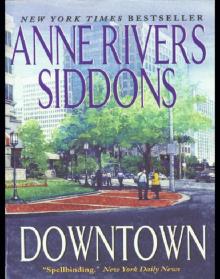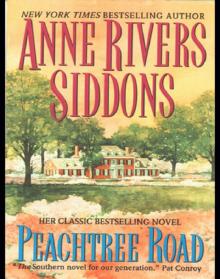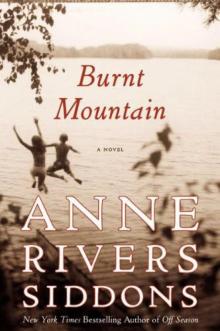- Home
- Anne Rivers Siddons
Homeplace Page 3
Homeplace Read online
Page 3
John Winship worked hard and well at his profession, and he doted on small DeeDee, but it was Claudia who filled his whole heart, taking up the empty spaces where John and Daisy Winship had dwelled for so long. She was his life, his pretty, chiming wife; her Irish whimsy lit his dour Scot’s temperament to frequent playfulness, and when she became pregnant with the baby who was to be John Micah Winship II and bear the name back into the homeplace, joy and fullness made his fair, freckled skin and the odd, light-struck gray eyes over the slanted cheekbones incandescent and arresting. He was, with his angles and sharpness, his ash-fair hair and brows and lashes, plain and almost sunless in repose. When joy or any other strong emotion took him, he drew the eye like wildfire. In those months of Claudia’s second pregnancy, people often looked after him on the street, and looked away and back again, uncertain why their eyes kept returning to this unprepossessing man. At first glance, he appeared almost hookworm-wan. But in those days John Winship shimmered with his own fire. When Claudia died in the bleached November dawn, the fire went out, and the ashes lay on his face and his heart and home for the rest of his life.
At the grief-stricken old family doctor’s suggestion, he engaged a wet nurse, a widow from nearby Lightning, who came with her own tiny son to keep the new white baby alive and stayed on to run the house and nurture tiny Micah … for he had not had the heart to call this child who had brought his wife to death by her name, and simply called her Micah, as they had planned to call the son she was supposed to have been. He did not bother with a middle name. Rusky Cromie loved pattering little DeeDee as quickly, if not as fully, as she did the new child, and cheerfully took her to her great, formless bosom along with baby Mike and her own infant. The latter she renamed J.W., out of a profound and not-at-all-awestruck admiration for John Winship, telling her compatriots in the Little Bethel African Methodist Church that any man who took on so after his dead wife so was most assuredly no tomcat, and moreover, that any man who worked such long, grueling hours both in nearby Atlanta and later in his own closed study to provide for his small, motherless daughters would be a good example for her son in his formative childhood years.
“Better than he own daddy, rest his soul, ’cause that man ain’t never spent no more time than he could he’p at home with me. Fo’ he died I reckon he knowed more about the inside of Gene Coggins’s poolroom than he do his home or his church.”
And so the three children, two small white girls and a huge-eyed, unsmiling black boy, grew from babyhood into childhood and beyond in that great, white shrine to a woman long dead.
3
BY THE TIME MICAH WINSHIP COULD REASON, ALL THREE children in the house on Pomeroy Street knew without having been directly told at whose hands Claudia Winship had died. John Winship and Rusky Cromie would have dutifully denied her culpability at once had she mentioned it, but Mike never did. A greater truth than theirs prevailed. The terrible knowledge gradually sank like a lightless black stone into the depths of her unconscious, but the circles of its passing spread endlessly outward. Mike went from troubling infancy to difficult childhood.
John Winship continued to keep the homeplace mowed and swept and painted, but he dreamed no more grand dreams for it and could not have said why he did not sell or rent it, knowing only that he must not, that the land was not only his but was, in some indefinable way, him. He did not think to move there himself. All he would ever have of Claudia was moored in the Pomeroy Street house. If he thought at all, he thought that someday DeeDee and a shadow husband might live there. He did not consider that Mike would ever live in the homeplace. He did not consider Mike much at all. If he stayed in his study and kept the stout oak door shut, he could not hear her thin, starveling wails from the nursery and could forget for long stretches at a time that she was there. And somehow, when Mike was not there, Claudia was. To hear the baby’s cries again after a long period of silence was to bear almost anew the terrible spear of his wife’s death. John Winship’s face gradually sank in upon itself like an effigy on a crusader’s tomb.
Pixielike DeeDee, who grew more like her mother every day, was the only being in the house who could coax a ghost of the old magical animation back into her father’s face. Despite Rusky’s attempts to interest him in the new baby, an attenuated infant with his own long, light bones and narrow skull and lambent eyes, he could bring himself only to touch her silky skull with the tip of his finger occasionally, or let her tiny fist close over it. He could not and did not rock her and sing college songs and popular ballads to her, as he had to baby DeeDee. He grew more and more silent, rigid, withdrawn, canted within himself. Attitudes hardened into prejudices, ideas into obsessions. The law and the homeplace and the young wife frozen for all eternity into the silver frame on his desk were the bones of his life, the armature on which he hung his days. DeeDee could skip in and out of his tower at will. Mike hovered outside, staring in at him with his own luminous seawater eyes, and could not enter. But she never ceased in the battering.
She was, of course, a trying child from the beginning. She cried loudly and long, and could not be comforted except by Rusky, and then only after much rocking and crooning. DeeDee, busy with first grade at the Lytton Grammar School and her tea sets and coloring books and dolls, clearly had little use for this new doll that would not allow itself to be dressed and fondled, but only wailed its frail and inconsolable grief into the silent house. John Winship continued to close his study door against the importuning cries. Mike wept on alone except for the patient black woman and her tiny son, who slept tranquilly in a wash basket beside Mike’s crib. After a while, as she grew, Mike stopped crying and began to do battle.
She balked and disputed on all sides the adults who attempted to manage her. Few even tried after a while, except Rusky, whose halfhearted admonitions never slid over into exasperation and whose arms were always outstretched for comfort instead of retribution. She fought with her small, flying fists the Lytton children who fell into her orbit. Not many did, until she entered first grade. Then she became the terror of her small society: slight, elfin, a slip of a child with thistledown hair and a quicksilver mind, curious about everything, contentious when the answers baffled her or failed to engage her intelligence, without physical fear, passionately devoted to the perceived underdogs around her. Her gruff goblin voice and belly laugh contrasted sharply with her spindrift appearance. Like her father, Mike in a passion drew eyes like a magnet. Notes and phone calls from her teachers streamed into the house at first, but John Winship dealt with them by not dealing with them, and eventually the stream dried to a trickle, then stopped. Mike’s perverseness became as accepted a fact as her motherlessness.
By the time she was eight or nine, her companions were a phalanx of little black boys from Lightning and Rusky’s sweet-tempered J.W., with whom she had grown up. With her band she roamed the deep woods behind the Winship house after school, swung from the dizzying heights of Indian Cave on a kudzu vine, caught crawfish in Turnipseed’s Creek. When, at her puberty, John Winship intervened and forbade further association with the boys on the grounds that “it just won’t do; it would break your mother’s heart,” Mike disappeared into the depths of the Lytton branch of the Carnegie Library in her free time, and only came out to eat and sleep. John Winship’s quiet household bowled on into the 1960s.
As Mike grew, Rusky aged rapidly and her blood pressure and “the sugar” grew more virulent, and the fall Mike turned twelve Rusky settled with a sigh of relief into the tiny tenant house at the back of the Winship property, which had long stood vacant, and thereafter came to the big house only until midafternoon. J.W. faded away, too, into the shabby concrete-block Negro high school on the edge of Lightning, and pretty, feminine DeeDee became a fussy little mother to her rebellious, changeling younger sister and a ghastly miniature wife to John Winship. It pleased and involved her endlessly to putter officiously with home economics and meals and little sugary treats for her father, and she never failed to lay out the least objectio
nable and most coordinated of Mike’s outfits for her to wear to school each morning, clicking her tongue wearily like a woman three times her age when Mike refused to put them on. Rusky did the actual cooking, leaving a meal for DeeDee to heat up each evening, and she did the heavy cleaning and washing and ironing, but John Winship was charmed and soothed with his fluttering surrogate, and praised her ministrations with all the rusty animation left to him. He did not precisely ignore Mike; he took her, with DeeDee, to Sunday school and church each week, and asked her with remote courtesy at least once during each evening what she had done that day and what she had learned in school, but since she always answered, “Nothing,” and since he knew that if fresh trouble broke over her duck-down head he would eventually learn of it from DeeDee, he did not try to peer beneath the smooth, closed surface of her angular little face. It would have seemed like prodding at a mirror.
DeeDee Winship could have had any young man she laid her blue eyes on, so Elizabeth Taylor-pretty was she, but from eighth grade on she had gone exclusively and inexplicably with Eugene Wingo, widely known as Duck, a handsome, hulking boy from Lytton’s first and only trailer park on the outskirts of town. From the very beginning of their alliance Rusky had pronounced him “sorry” and the only time Mike ever saw the gleam of tears in John Winship’s eyes was at DeeDee’s wedding to him directly after their graduation from Lytton High. DeeDee dutifully settled into a new semi-wide with Duck and began classes at the nearby state teacher’s college, and Duck took his bursting calves and biceps, his Robert Mitchum hooded eyes and sliding grin, and his reputation as the best Triple-A fullback in the state’s recent history into sales. For that first year, he sold Ford pickups and John Deere tractors to every Lytton Blue Devils supporter in a fifty-mile radius. It was a job with a high gratification quotient, but certain limitations as to future. The dealership inevitably ended up with more pickups than the Blue Devils had supporters. Duck moved on into hardware.
DeeDee got her degree in elementary musical education six days before her first child was born. Duck got his fourth job, selling marine fixtures 350 miles inland, the day after the baby arrived. They named the child John Winship Wingo, and John Winship set up an ironclad trust for him and slipped DeeDee a thousand dollars so she could afford to stay home with him for a while. It was a good thing. By the time Duck lost the marine job and took one selling wholesale beauty supplies across six states from his Studebaker, the baby was old enough to bring to Rusky’s laconic and shortlived successor, Pinky, at the Pomeroy Street house, and DeeDee was able to get her certificate and begin teaching music to the bovine, white-eyed children at the Lytton Grammar School. It was widely agreed among parents and faculty that DeeDee had a voice just like Yma Sumac’s. Mike, closeted away in her upstairs room with copies of Look and Life and her hopeful columns for the Lytton High Blade, came to flinch as DeeDee warbled ersatz Andean arias to the baby when she came to pick him up after school.
A week after Mike’s thirteenth birthday Rusky died in her sleep in the small house behind the privet hedge, and all the howling loneliness that her protective black bulk had held at bay crashed in on Mike. She was inconsolable. She wept behind her schoolbooks in her classes, she wept in her room in the afternoons, before her father came home from work, and try though she might, she could not keep the tears from sliding down her cheeks in the dreadful, silent dinner hours. John Winship finally lifted his head from his folded newspaper to say, “I think you’d better go stay with DeeDee until you can control yourself, Micah. She never carried on like this even when your mother died.”
The thought of DeeDee’s terrible miniature kingdom in the trailer, with Duck’s endless television programs blaring out into the nighttime trailer park, made her swallow the tears, even though the cold salt lump sat stonelike in her throat for days and she could not eat. Dinner, which had been bad enough since DeeDee and Rusky had left the echoing house, became torturous to Mike and John Winship alike. Finally, to her vast relief, he gave up the charade and asked that she simply bring him his plate to his study, pleading the press of an unusually tedious and complicated tax case. He ate there in silence thereafter, and Mike retreated gratefully to the haven of her room with her own plate. After she had finished the meal—a sad affair compared to the ones that Rusky and even DeeDee had prepared—she fled to the library. And sometimes, without his knowledge and against his wishes, she slipped back through the privet hedge and spent the evenings with J.W.
The boy, grown now almost to man size, and so quiet in the presence of whites that it was nearly impossible to tell if he was possessed of a functioning intelligence, had simply stayed on in the little house after his mother’s death. John Winship had not attended Rusky’s splendid funeral at Little Bethel, and he had not allowed Mike to go, though she had pleaded and sobbed and stormed.
“It’s not your place, Micah,” he had said coldly and finally. “You’d make everyone there uncomfortable, and it would ruin things for everyone else who loved her. People want to be with their own kind at times like this.” Mike had stayed closeted in her room for two days afterwards, until hunger had finally driven her out. John Winship did not speak of Rusky again to her for a long time.
But apparently he did to J.W., because from the weekend after Rusky’s funeral on, J.W. appeared silently in the backyard to do yard work, and on most school afternoons he came for a couple of hours and did the heavy cleaning, vacuuming, and polishing that Rusky had always done. There was always a weekly sum of money left for him—an uncommonly generous one, for those times in the South—in the brass bowl that had been Daisy Winship’s on the dining room table. He ate his supper at the home of a cousin in Lightning and seemed to have adequate money for schoolbooks, a few clothes, and most notably a used television set. He never went anywhere but school, church, across town to meals, and through the hedge to the Winship house to do his chores, and in the evenings after he had walked back to the dim little cabin from the cousin’s house, he did his homework and then switched on Jackie Gleason or Sid Caesar and Imogene Coca or Peter Gunn. At thirteen he might have been a resigned, not unhappy man of forty.
On the evenings that Mike joined him to sit on the edge of the swayback bed that had been Rusky’s and stare at the blue-flickering old Dumont, they had as little to say to each other as they had in the days of crawfish and Indian Cave. But their silence was not strained. Mike never felt prickly or anxious with J.W., as she did with most other people, and he did not seem as eye-avertingly deferential with her as he did with other white people. It was as if there was a bond between them that was so deep that it did not need words, though aside from that bond there was no common ken at all in either. And it was true; the bond had been—and still was—their childhood in the shadow of the dead woman and the grieving, remote man in the Pomeroy Street house, and the constant benison of Rusky. Mike alone knew that J.W.’s closed, mulish face hid a sunny, unintimidated intelligence and a naive, biddable sweetness. He alone knew that she still sometimes wept for his mother. It was two or three months after Rusky’s death before Mike learned that her father was paying for J.W.’s food, clothing, and incidental expenses. Priss Comfort told her.
“Then why wouldn’t he let me go to her funeral?” Mike stormed. “It’s hypocritical to support J.W. and look after him and not even go to her funeral, or let me go. It’s worse than that. It’s sneaky!”
“No, it’s not,” Priss Comfort said severely. “It’s just his way. Your father may be a lot of things, but sneaky is not one of them. You don’t begin to know what he’s like. I’d advise you to leave off calling him names until you do.”
Mike did.
4
PRISS COMFORT WAS, BESIDES RUSKY, THE ONLY FIXED STAR in Mike’s firmament. Priss, from the odd-looking little stone cottage down by the high school athletic field, was stimulant, refuge, and friend to Mike from her babyhood on. A massive, chestnut-haired spinster with a precise, clarion voice who taught English at Lytton High and had been a childhood frie
nd to John Winship, Priss had been the first person at the house after the doctor when Claudia died. Thereafter she was at the Winship house several times a week until Mike was in kindergarten, and then at least once each week.
When Mike was adjudged by Rusky old enough to cross the street, she spent a great deal of time in Priss’s book-choked, cat-infested house, where Priss read aloud to her, answered her million restless questions, and talked reasonably with her on any subject one might pursue with a normally intelligent adult. In the savagely untidy little house Mike absorbed literature, liberal politics, art, music, Priss’s own brand of fierce ethics, local history, and Lytton genealogy, along with elsewhere forbidden Coca-Colas and Nehis. Priss’s own drinks were usually ruddy with bourbon, and sometimes she fell abruptly asleep on the sofa listening to Mike. This did not strike Mike as any odder than anything else about Priss, so she never thought to mention it at home. Priss filled an undefined but essential gap between Rusky and DeeDee, and she moved effortlessly into the space where John Winship might have been. She took Mike to buy clothes and have her fine, silky hair shaped and trimmed, and heard her homework and her deepest hopes, hurts, and confusions, as well as her frequent rages and frustrations. As a result, Mike dressed as eccentrically as Priss did, with a severe style and flair that no one in Lytton recognized as such, and developed an acerbic, elliptical manner of thinking and speaking.
Priss did none of these things for DeeDee. DeeDee needed no advice on her frilled and starched clothes and curly hair, and John Winship never failed to listen gravely to her exemplary homework and her small, conventional indignities. She had no uncomfortable confusions of purpose, and no curiosity. Rusky shook her head darkly at Priss Comfort’s fruity bourbon aura, but she said often, “I don’t know what we do ’thout Miss Priss.”

 Colony
Colony Nora, Nora
Nora, Nora House Next Door
House Next Door Homeplace
Homeplace Downtown
Downtown Peachtree Road
Peachtree Road Sweetwater Creek
Sweetwater Creek Fault Lines
Fault Lines Low Country
Low Country The Girls of August
The Girls of August Burnt Mountain
Burnt Mountain Islands
Islands